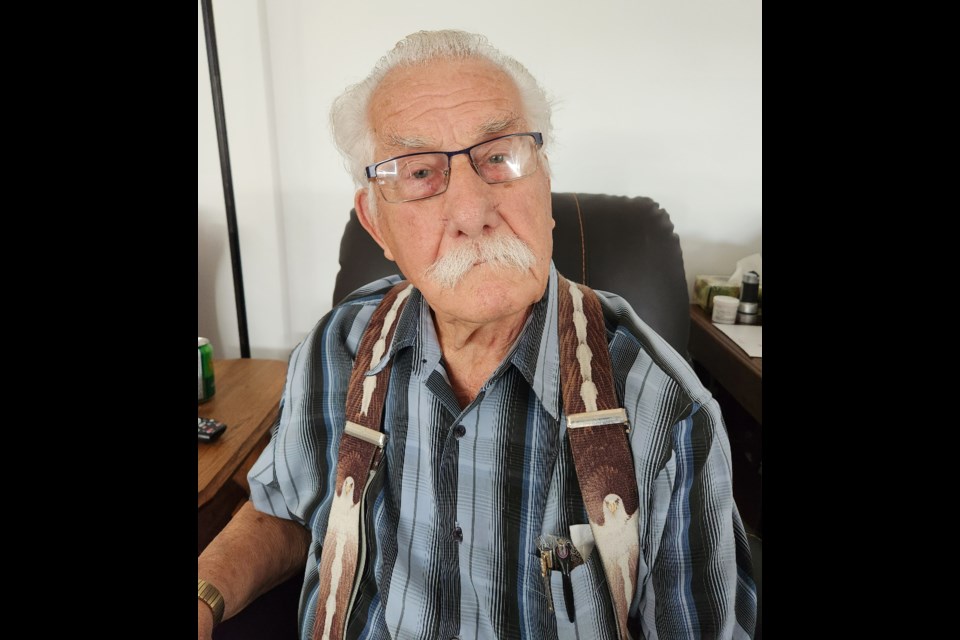Ken Harder spent three years in West Germany maintaining Canada’s fighter planes during the Cold War, but that was enough time to make friends, learn the language and discover the culture.
Harder spent time at several air bases during his 27-year career with the Royal Canadian Air Force. However, his time in West Germany left an indelible impression on him.
“It was good. I had lots of friends (in the air force) and knew lots of German people. My sister spoke German and I could understand German pretty good … ,” the 88-year-old said. “I didn’t have any trouble with (the) language; most German I can understand. Not anymore, though.”
Harder was stationed in West Germany in the 1960s during his one overseas military tour. He saw only a few bombed-out buildings during his travels of the partitioned nation — the Allies mercilessly pummelled the country during the Second World War — because money from the United States had helped rebuild the infrastructure.
“Of course, wherever there’s a military installation, when the armed forces came in, they took that over (and also helped rebuild the infrastructure),” he said.
Harder’s sister, Ethel, was living in Germany because she had married a flight instructor. He regularly visited the couple and often enjoyed a home-cooked meal, a nice change from military grub.
The veteran also enjoyed other home-cooked meals whenever he visited his German friends.
Harder recalled touring Western Europe once with a German friend who was also a cab driver. The friend was taking a vacation with his family — including the mother-in-law — and invited the Canadian for the ride. The group visited other parts of Germany, the Netherlands and France.
“He says, ‘I have to go France. Would you like to come along for the ride?’ He says, ‘I got all the paperwork and everything,’” said Harder. “I said sure.
“He knew everything about everywhere. He was just like a brother.”
The love of flying
Harder’s love of airplanes began when he was a child during the Second World War. He lived in Rosthern, 65 kilometres northeast of Saskatoon, and the sights and sounds of Harvard training planes regularly flying near his community usually caught his attention.
“I used to draw aircraft on my scribbler (notebook), so I guess I was always interested in them,” he said. “I just liked them. They flew across our yard all the time.”
Harder enlisted in the air force in 1953 and became a mechanic. He initially trained at Camp Borden in Ontario before he was shipped to Camp Shilo in Manitoba for further training.
The first planes he fixed were Harvards and other small aircraft the military used to train pilots.
“When there were repairs to be done, you did ’em,” he remarked, adding his brother Hal was also an RCAF mechanic who maintained radar equipment.
The veteran eventually began working on the renowned North American F-86 Sabre jet, an iconic machine that made its name shooting down Russians during the Korean War.
“They were one of the best in the world,” he said.
After fixing the planes, Harder would suit up and ride with the pilot to ensure his repairs held up. The possibility of mechanical failure didn’t bother him; flying was flying.
“It’s exciting,” he said.
Harder’s career in the RCAF ran from 1953 to 1980. During that time, he served in Penhold, Alta., Saskatoon, Germany, Penhold and Moose Jaw, a community he has called home for more than 60 years.
After retiring from the military, Harder worked for the City of Moose Jaw as a labourer who cut grass and dug cemetery plots. He lived in the same home for decades across from the Old Cemetery on Caribou Street East.
In his retirement, he rebuilt a 1928 Model A Ford, a vehicle his parents drove when he was a boy. With a chuckle, he added that he never owned a similar vehicle because he lacked money, so he simply built one instead.




